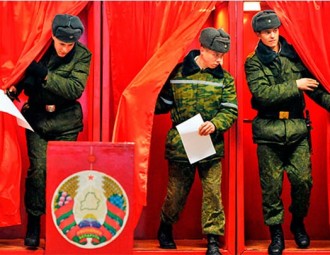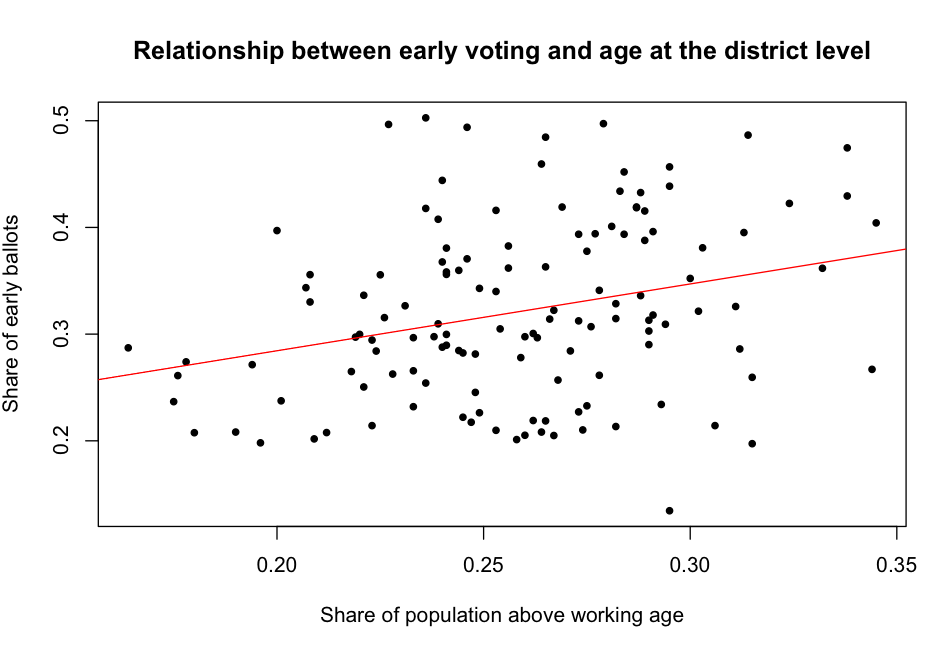Early voting is a secret to a successful authoritarian election

Belarus encourages early voting because it eases the manipulation of electoral outcome: for early ballots to be valid only the presence of two members of the precinct election commission is required.
The official date for Belarus’s presidential election is 11 October. But if past elections are any guide, every third Belarusian will vote during the so-called “early voting” period, between 6 and 10 October.
In fact, 30 percent of Belarusians cast their ballots by the evening of 9 October, according to the Central Election Commission of Belarus.
It is a well-known secret that early ballots facilitate electoral fraud. Unsurprisingly, districts with higher prevalence of early voting in the 2010 presidential election demonstrated not only greater turnout, but also greater support for President Aliaksandr Lukashenka. But we know little about the parts of Belarus where citizens turn out to vote early. Examining the distribution of the early vote in the 2010 presidential election reveals some interesting patterns.
The media frequently cites students, “herded” to the ballot boxes by university administrators, as the main victims of early voting pressures. Yet in the 2010 election remote agricultural districts with larger elderly population and with lower education levels demonstrated the greatest incidence of early voting. Such remote rural locations fall under the radar of international election observers.
Who votes early?
Only a small percentage of Belarusian voters who reside or permanently stay abroad cast absentee ballots in Belarusian elections. Voters inside Belarus cast many more early ballots.

Indeed, any citizen can vote early – no proof of being unable to vote on the official election day is required. This may explain why Belarusian pensioners, who would appear to have fewer time constraints than the working-age population, constitute an important group of early voters.
Students vote early under the pressure of university administrators. This week, Poland-based Belarusian language TV channel Belsat reported that at polling station number 52 in Minsk, located in one of the Belarusian State University dorms, every third student voted on the very first day of early voting. Early voting is also widespread among the police, military, and government officials, urged to vote by their employers.
Getting out the early vote
Interpreting the official electoral results based on early voting cannot reveal the true levels of support for the incumbent president or the opposition candidates. Nonetheless, district-level figures on early voting in the 2010 election, published by the Central Electoral Committee, do tell an interesting story about the regional dynamics of elections.
In the 2010 election, 32 percent of Belarusians voted early. The share of early ballots was largest in provincial areas. In Minsk, a city with over 30 institutions of higher education and a student population of nearly 200 thousand, only 22 percent of votes were cast early, which is below the national average.
At the district level, early ballots represented anywhere between 13 percent in Baranovichi district in southwest Belarus and 50 percent in Krasnapolle in southeast Belarus.
Krasnapolle is a remote agricultural district in eastern Belarus. Its centre, a sleepy town of six thousand, lies52 kilometres away from the nearest railway station and 120 km away from the nearest regional centre, Mahileu.
According to the official electoral results, 89 percent of Krasnapolle voters supported Lukashenka in 2010. As the elections commenced, local authorities organised numerous festivals and celebrations to encourage participation.
Nine other districts where nearly half of all ballots were cast early in 2010 are Byeshankovichy, Bykhaw, Dubrowna, Kas'tsyukovichy, Ms'tsislaw, Pastavy, Shchuchyn, Shumilina, and Voranava. Like Krasnopole, these districts lie far away from Minsk and specialise in agriculture.
All districts with high incidence of early voting have higher shares of pensioners. Lukashenka’s most devout supporters; the elderly need no pressure to vote early. In the 2010 data, 10 percent increase in the share of the population above working age is associated with 7 percent increase in the share of early ballots from the total number of ballots cast.
The share of the early vote also correlates with the share of the population with secondary education at the district level. Areas with just ten percent more people with university diplomas have a 5 percent lower share of the early vote.

What explains the negative relationship between education level and early voting? One possibility is that people with lower education have fewer outside employment options and face greater risks for disobeying employer orders. Another possibility is that people with college degrees are less likely to support Lukashenka and therefore do not turn out to vote early, or at all.
Why vote early?
The state goes to great lengths to encourage early voting. In Minsk, Belarusians are reminded that they can perform their civic duty any day even while riding the metro to work.
This year’s notable early voters included the head of the Presidential Staff Marianna Schetkina and the head of the Central Electoral Commission Lidzia Jarmoshyna. Surrounded by a crowd of journalists as she cast her ballot, Jarmoshyna said that while some observers and journalists frown upon early voting, the Belarusian people “come to vote early with pleasure.”
At polling station number 48 in Minsk, where Jarmoshyna was casting her ballot on 7 October, first-time voters as well as voters with children received presents, including watches and crystal bowls and ornaments sponsored by Minsk-Arena.
It is no secret that Belarus encourages early voting because it facilitates the manipulation of the electoral outcome. The Belarusian legislation requires nothing more than the presence of at least two members of the precinct election commission for the early ballots to be valid.
As of 5 October, Belarusian Electoral Commission accredited 910 international observers to monitor the 2015 presidential election. Of these, 382 observers represent the Commonwealth of Independent States and 344 observers represent the Office for Democratic Institutions and Human Rights of the Organisation for Security and Cooperation in Europe (OSCE). Pro-Lukashenka political parties and organisations within Belarus supplied another 28,578 observers.
The international observers have started trickling into the country as the election began, but most will arrive to monitor on the official election day. Few will reach remote rural areas such as Krasnopolle, especially within the early voting period.
Domestic observers who do arrive at the polling stations during the early voting period encounter unexpected obstacles. Volha Katsiankova, an accredited observer from Conservative Christian Party of the Belarusian People's Front, visited the polling station located in Minsk’s School No. 7 on 8 October. She was sent home on the pretext that her accreditation documents mentioned only the official Election Day, 11 October.
The few observers who manage to penetrate register numerous irregularities. Just a day into early voting this year, observers from the “Human Rights Defenders for Free Elections” campaign, organised by the Human Right Center “Viasna,” along with the RHRPA “Belarusian Helsinki Committee,” have pointed out that their turnout estimates differed by 5.5 per cent from those provided by the authorities.
Many more violations will be revealed as the election continues. But whatever the final tally of votes, Lukashenka seems to have won the remote agricultural districts with elderly uneducated population well before the official election day.
Originally published at BelarusDigest
-
03.01
-
07.10
-
22.09
-
17.08
-
12.08
-
30.09








































